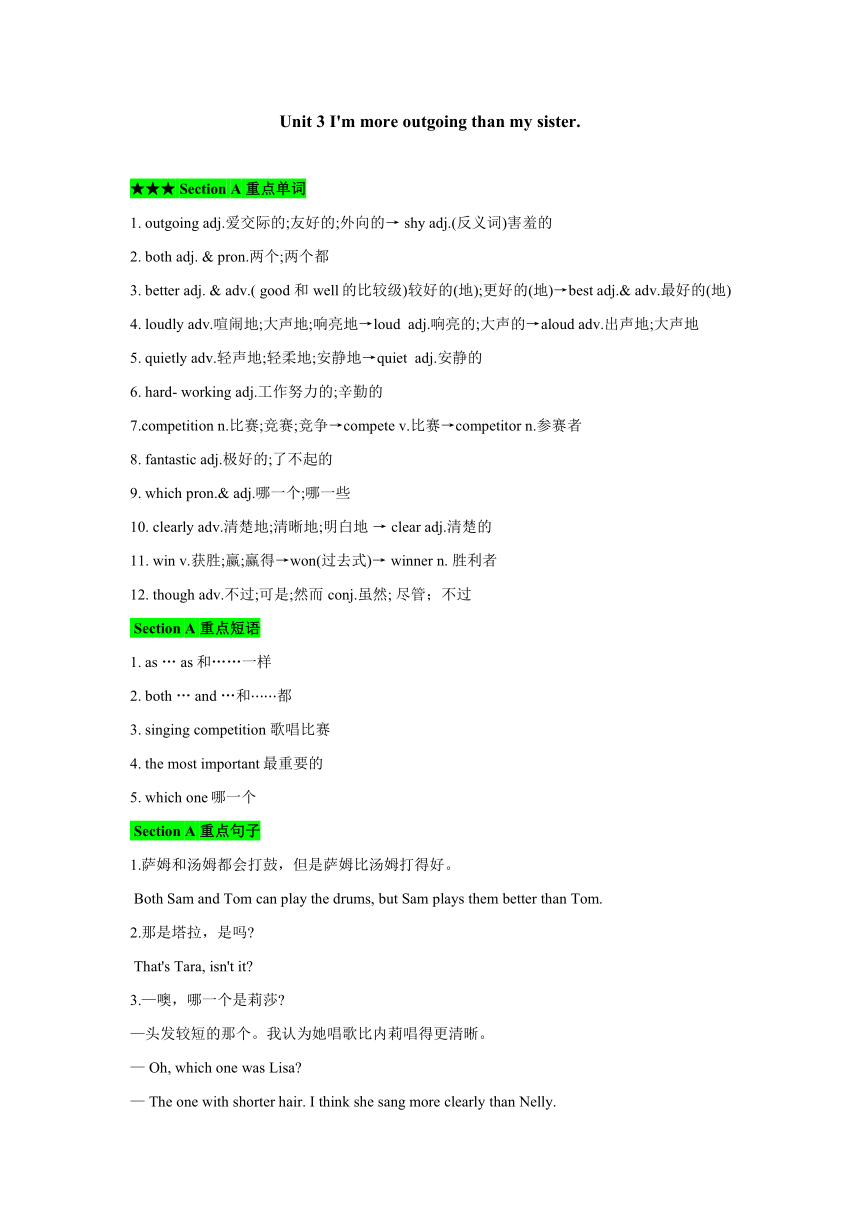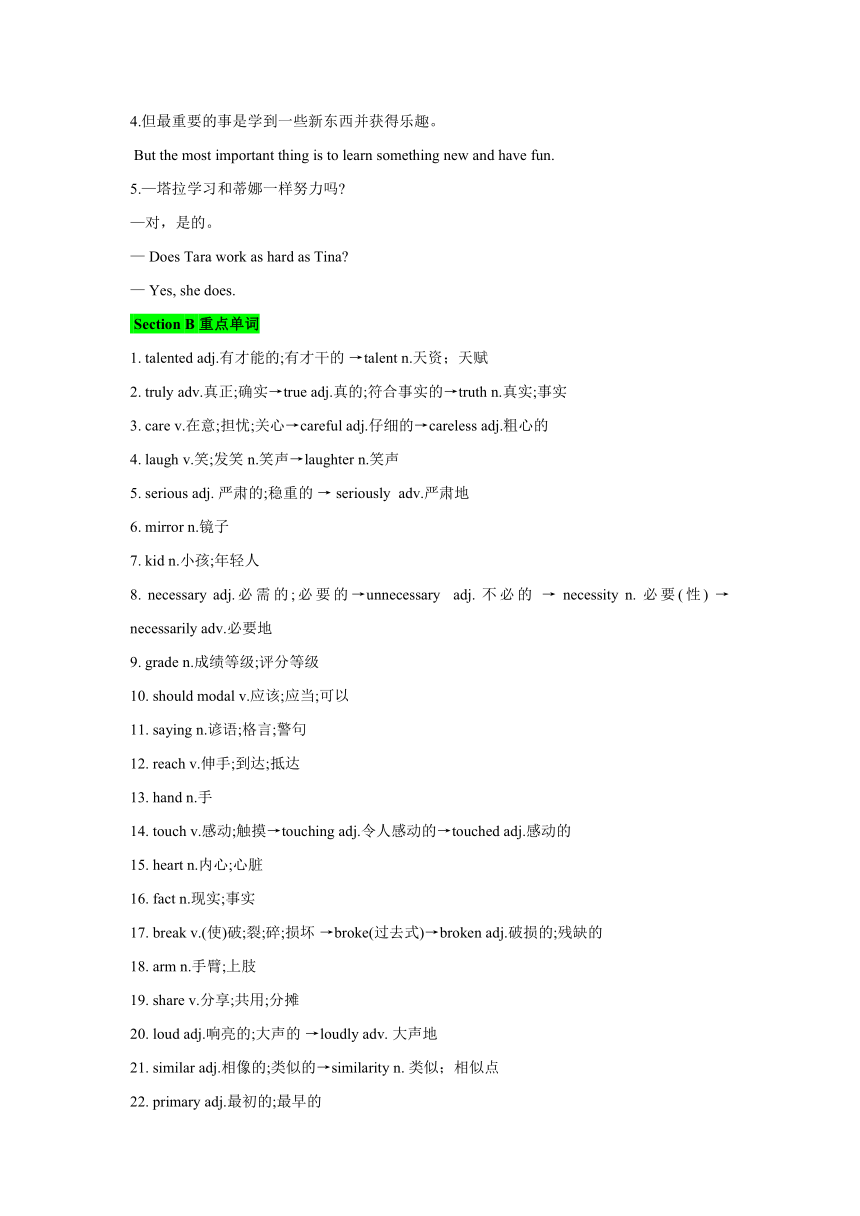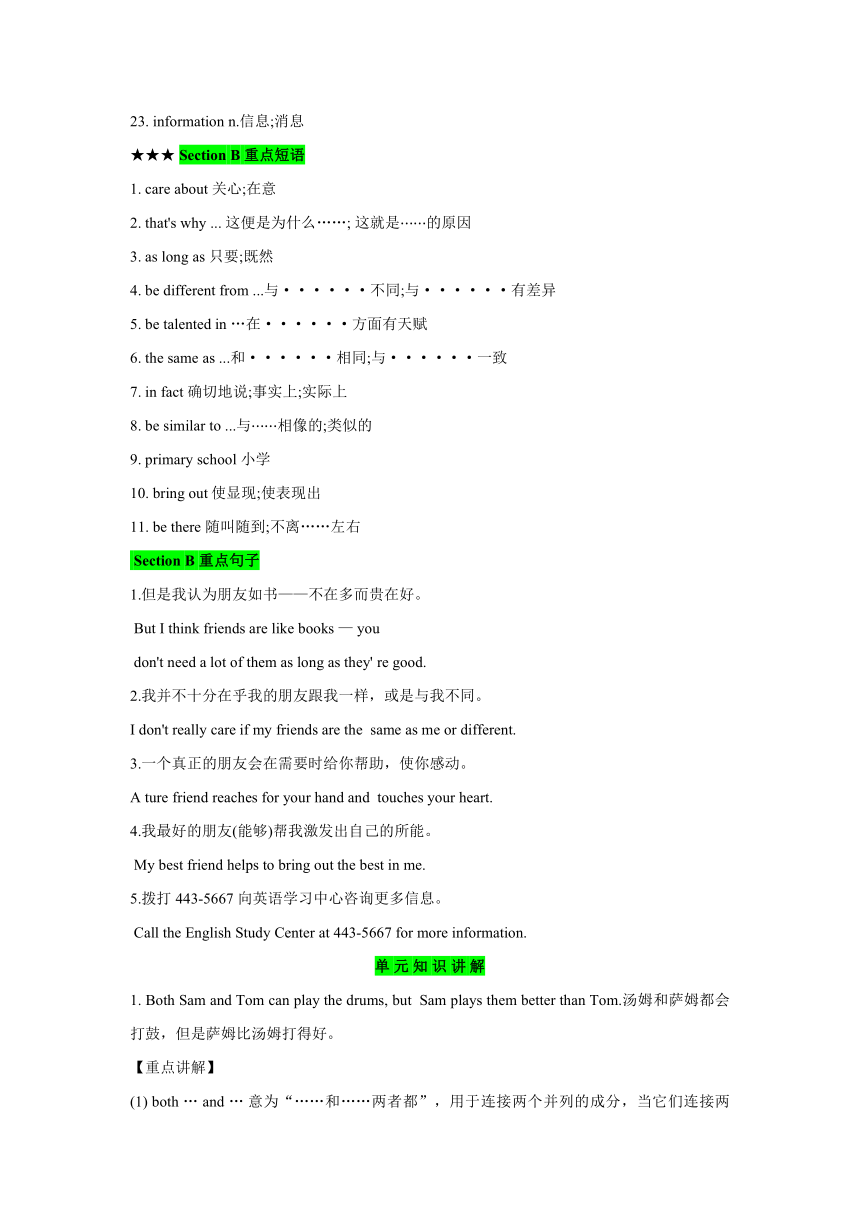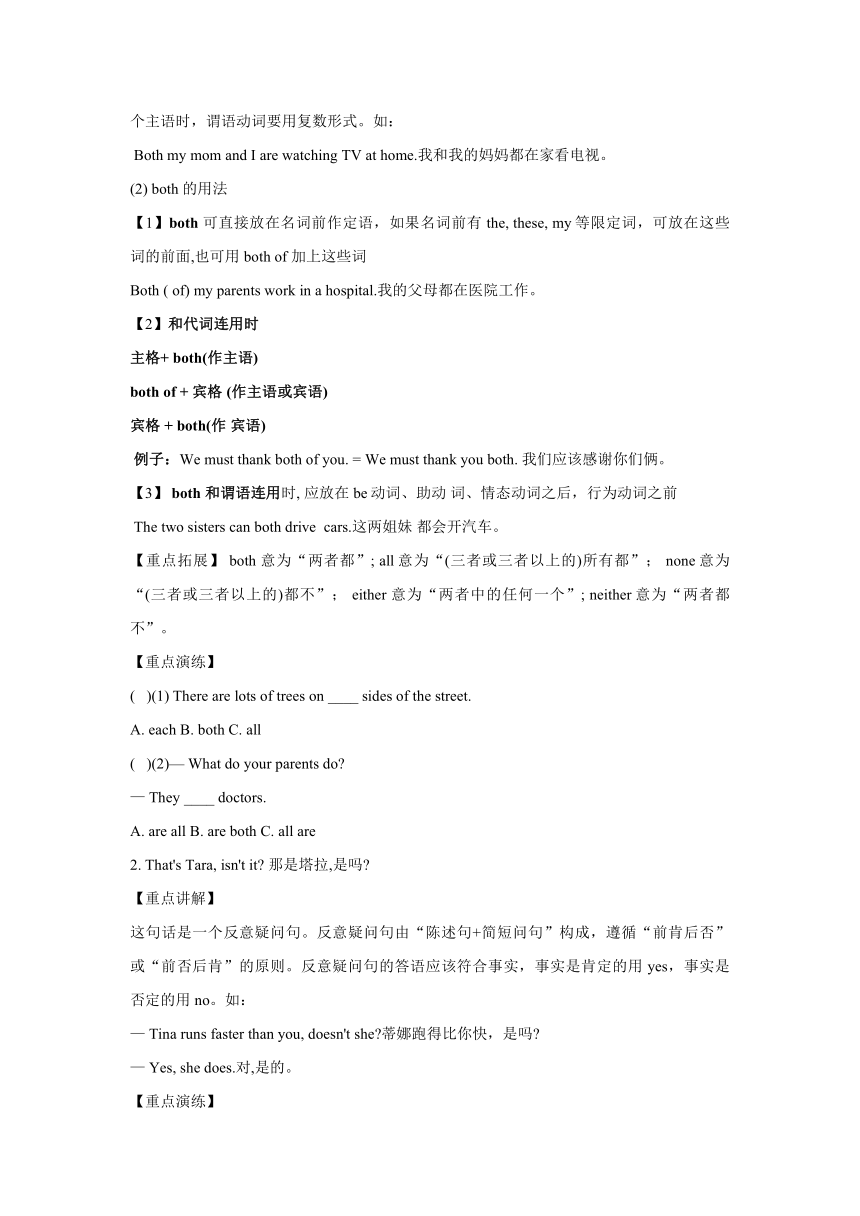Unit 3 I'm more outgoing than my sister.知识点讲义 2024-2025学年人教版英语八年级上册
文档属性
| 名称 | Unit 3 I'm more outgoing than my sister.知识点讲义 2024-2025学年人教版英语八年级上册 |

|
|
| 格式 | docx | ||
| 文件大小 | 28.6KB | ||
| 资源类型 | 教案 | ||
| 版本资源 | 人教新目标(Go for it)版 | ||
| 科目 | 英语 | ||
| 更新时间 | 2024-10-16 00:00:00 | ||
图片预览




文档简介
Unit 3 I'm more outgoing than my sister.
★★★ Section A 重点单词
1. outgoing adj.爱交际的;友好的;外向的→ shy adj.(反义词)害羞的
2. both adj. & pron.两个;两个都
3. better adj. & adv.( good 和 well的比较级)较好的(地);更好的(地)→best adj.& adv.最好的(地)
4. loudly adv.喧闹地;大声地;响亮地→loud adj.响亮的;大声的→aloud adv.出声地;大声地
5. quietly adv.轻声地;轻柔地;安静地→quiet adj.安静的
6. hard- working adj.工作努力的;辛勤的
7.competition n.比赛;竞赛;竞争→compete v.比赛→competitor n.参赛者
8. fantastic adj.极好的;了不起的
9. which pron.& adj.哪一个;哪一些
10. clearly adv.清楚地;清晰地;明白地 → clear adj.清楚的
11. win v.获胜;赢;赢得→won(过去式)→ winner n. 胜利者
12. though adv.不过;可是;然而 conj.虽然; 尽管;不过
Section A 重点短语
1. as … as和……一样
2. both … and …和 都
3. singing competition 歌唱比赛
4. the most important最重要的
5. which one哪一个
Section A 重点句子
1.萨姆和汤姆都会打鼓,但是萨姆比汤姆打得好。
Both Sam and Tom can play the drums, but Sam plays them better than Tom.
2.那是塔拉,是吗
That's Tara, isn't it
3.—噢,哪一个是莉莎
—头发较短的那个。我认为她唱歌比内莉唱得更清晰。
— Oh, which one was Lisa
— The one with shorter hair. I think she sang more clearly than Nelly.
4.但最重要的事是学到一些新东西并获得乐趣。
But the most important thing is to learn something new and have fun.
5.—塔拉学习和蒂娜一样努力吗
—对,是的。
— Does Tara work as hard as Tina
— Yes, she does.
Section B 重点单词
1. talented adj.有才能的;有才干的 →talent n.天资;天赋
2. truly adv.真正;确实→true adj.真的;符合事实的→truth n.真实;事实
3. care v.在意;担忧;关心→careful adj.仔细的→careless adj.粗心的
4. laugh v.笑;发笑n.笑声→laughter n.笑声
5. serious adj. 严肃的;稳重的 → seriously adv.严肃地
6. mirror n.镜子
7. kid n.小孩;年轻人
8. necessary adj.必需的;必要的→unnecessary adj. 不必的 → necessity n. 必要(性) → necessarily adv.必要地
9. grade n.成绩等级;评分等级
10. should modal v.应该;应当;可以
11. saying n.谚语;格言;警句
12. reach v.伸手;到达;抵达
13. hand n.手
14. touch v.感动;触摸→touching adj.令人感动的→touched adj.感动的
15. heart n.内心;心脏
16. fact n.现实;事实
17. break v.(使)破;裂;碎;损坏 →broke(过去式)→broken adj.破损的;残缺的
18. arm n.手臂;上肢
19. share v.分享;共用;分摊
20. loud adj.响亮的;大声的 →loudly adv. 大声地
21. similar adj.相像的;类似的→similarity n. 类似;相似点
22. primary adj.最初的;最早的
23. information n.信息;消息
★★★ Section B 重点短语
1. care about 关心;在意
2. that's why ... 这便是为什么……; 这就是 的原因
3. as long as 只要;既然
4. be different from ...与······不同;与······有差异
5. be talented in …在······方面有天赋
6. the same as ...和······相同;与······一致
7. in fact 确切地说;事实上;实际上
8. be similar to ...与 相像的;类似的
9. primary school 小学
10. bring out使显现;使表现出
11. be there 随叫随到;不离……左右
Section B 重点句子
1.但是我认为朋友如书——不在多而贵在好。
But I think friends are like books — you
don't need a lot of them as long as they' re good.
2.我并不十分在乎我的朋友跟我一样,或是与我不同。
I don't really care if my friends are the same as me or different.
3.一个真正的朋友会在需要时给你帮助,使你感动。
A ture friend reaches for your hand and touches your heart.
4.我最好的朋友(能够)帮我激发出自己的所能。
My best friend helps to bring out the best in me.
5.拨打443-5667 向英语学习中心咨询更多信息。
Call the English Study Center at 443-5667 for more information.
单 元 知 识 讲 解
1. Both Sam and Tom can play the drums, but Sam plays them better than Tom.汤姆和萨姆都会打鼓,但是萨姆比汤姆打得好。
【重点讲解】
(1) both … and … 意为“……和……两者都”,用于连接两个并列的成分,当它们连接两个主语时,谓语动词要用复数形式。如:
Both my mom and I are watching TV at home.我和我的妈妈都在家看电视。
(2) both 的用法
【1】both 可直接放在名词前作定语,如果名词前有 the, these, my等限定词,可放在这些词的前面,也可用 both of 加上这些词
Both ( of) my parents work in a hospital.我的父母都在医院工作。
【2】和代词连用时
主格+ both(作主语)
both of + 宾格 (作主语或宾语)
宾格 + both(作 宾语)
例子:We must thank both of you. = We must thank you both. 我们应该感谢你们俩。
【3】 both 和谓语连用时, 应放在 be动词、助动 词、情态动词之后,行为动词之前
The two sisters can both drive cars.这两姐妹 都会开汽车。
【重点拓展】 both 意为“两者都”; all意为“(三者或三者以上的)所有都”; none意为“(三者或三者以上的)都不”; either 意为“两者中的任何一个”; neither意为“两者都不”。
【重点演练】
( )(1) There are lots of trees on ____ sides of the street.
A. each B. both C. all
( )(2)— What do your parents do
— They ____ doctors.
A. are all B. are both C. all are
2. That's Tara, isn't it 那是塔拉,是吗
【重点讲解】
这句话是一个反意疑问句。反意疑问句由“陈述句+简短问句”构成,遵循“前肯后否”或“前否后肯”的原则。反意疑问句的答语应该符合事实,事实是肯定的用 yes,事实是否定的用 no。如:
— Tina runs faster than you, doesn't she 蒂娜跑得比你快,是吗
— Yes, she does.对,是的。
【重点演练】
( ) You watched the singing competition yesterday,____
did you B. don't you C. didn't you3. I'm shy so it's not easy for me to make friends.我很腼腆,因此交朋友对于我来说不容易。
It's + adj.+ for/ of sb. to do sth.意为“对某人来说,做某事是 的”
【重点讲解】
It's+ adj. + for sb. to do sth. adj.为描 述事物特征的词, 修饰的是 to do sth.
如:necessary, important, difficult, hard, easy, interesting, boring...
It's hard for me to answer your question.回答你的问题对我来说太难了。
It's+ adj. + of sb. to do sth. adj.为描述人物品质及性格特征的词,修饰的是 sb.
如:kind, nice, clever, foolish . ..
It's kind of him to show me the way。他出于善意,给我指路。
【重点演练】用正确的介词填空。
(1) It's dangerous ____ a child to stay at home alone.
(2) It's very nice ____ you to help me with my study.
4. I don't really care if my friends are the same as me or different.我并不十分在乎我的朋友跟我一样或与我不同。
【重点讲解】
(1) if在这里作连词,意为“是否”,引导宾语从句。如:
I want to know if he can play the drums. 我想知道他是否会打鼓。
(2) the same as …意为“和 一样;与 一致”;表示“与 不同”用 be different from ...;表示“与······相似”用 be similar to ...。如:
My idea is the same as yours.我的想法和你的一样。
5. A true friend reaches for your hand and touches your heart. 一个真正的朋友会在你需要时给你帮助,使你感动。
【重点讲解】
reach for one's hand 意为“伸出手帮某人一把”。
此处 reach 意为“伸出(手;手臂)”,此处为不及物动词。
reach 还可作及物动词,后面直接加地点名词,意为“到达;抵达”。如:
They didn't reach Chengdu until it was dark.他们天黑以后才到达成都。
【重点拓展】与 reach 意思相近的词语还有 arrive 和 get,但是它们的用法有所区别,具体如下:
①reach表示“到达;抵达”的时候是及物动词,后面直接接宾语。
② arrive 是不及物动词,后面接地点的时候要先接介词 in(+大地点)或 at(+小地点)。
③get是不及物动词,后面应先加介词 to,再接地点。如:
He reached Beijing last Sunday. = He arrived in Beijing last Sunday. = He got to Beijing last Sunday.他上周日到达北京。
(2) touch one's heart 意为“打动某人的心;令某人感动”,其中 touch 用作及物动词,意为“感动”。如:
The story touched my heart. 这个故事令我感动。
【重点拓展】 touch的形容词: touched 感动的,相当于 moved; touching 令人感动的,相当于 moving。如:
This story is really touching/ moving, soI'm touched/ moved.这个故事太感人了,所以我深受感动。
【重点演练】
(1)选用 reach, arrive 与 get 填空。
① If you ____ too late, the host will be unhappy.
② When did Jim ____ the subway station
③ We must ____ to school before 8:00 in the morning.
(2)用括号内所给单词的适当形式填空。
I was so ____( touch) after watching the movie Mom that I couldn't sleep.
6. I think a good friend makes me laugh.我认为好朋友会使我欢笑。
【重点讲解】
make 在此处表示“使;让”。 make sb. do sth.意为“让某人做某事”。 make sb./ sth. +adj.意为“使/让某人/某事怎么样”。如:
His mother made him finish the work alone.他妈妈让他一个人完成这项工作。
Comedies make me very happy.喜剧让我很开心。
【重点演练】
( ) The boss (老板) makes the worker____10 hours every day.
work B. working C. to work
重 点 语法 小结
形容词和副词的比较级
1.定义
英语中,形容词和副词有三个等级:原级、比较级、最高级。当两者进行比较时,用比较级;三者或三者以上进行比较用最高级。比较的对象通常是属于同一性质或范畴的人或物。
2.构成
形容词、 副词变化规则
一般情况直接在词尾加 - er,若以字母e结尾,则直接加-r。 long— longer; tall— taller; late — later; nice— nicer
以一个辅音字母结尾的重读闭音节词以“辅音字 母+y”结尾的双音节词,先双写末尾的辅音字母, 再加- er。 先变 y为i, 再加- er。 big— bigger; thin — thinner; fat— fatter easy— easier; happy— happier; heavy — heavier; early— earlier
多音节词和部分双音节词特殊单词词前加more。 difficult — more difficult; careful — more careful
不规则变化(好坏多少远老)
good/ well— better; bad — worse; many/ much — more; little—less,far— farther/ further,
old—elder(作定语)
3.用法
(1)“A+谓语 + 比较级 + than + B”意为“A 比 B 更……”。如:
Linda is taller than Sam. 琳达比萨姆高。
(2) 比较级之前可用 much, far,a bit,a lot,a little, even 等词修饰,用以加强语气。如:
Dad feels much better today.爸爸今天感觉好多了。
(3)“比较级 + and + 比较级”意为“越来越……”。如:
Our society will become better and better.我们的社会将变得越来越好。
(4)“ the+比较级 , the+比较级 ”意为“越 ,越 ”。如:
The more you eat, the fatter you will become.你吃得越多,就会变得越胖。
(5)“A + 谓语 + the + 比较级 + of the two …”意为“A 是两者之中更……的”。如:
She is the more outgoing of the two girls.她是两个女孩中更外向的。
【重点拓展】①当表示两者在某一方面程度相同时,用“ as+形容词或副词原级+ as”结构。如:
I think science is as important as math. 我认为科学和数学一样重要。
②当表示一方在某一方面不及另一方时,用“ not as/ so+形容词或副词原级 + as”结构。如:
It is not as/ so cold today as yesterday. 今天没有昨天冷。
【语法演练】
1. I think Sally did as ____( good) as Lucy in the math competition.
2. Linda is much ____ ( hard- working) than Anna.
3. This box is much ____( heavy), isn’t it
4. Jenny works ____, but David works even ____.( hard)
5. This story is very ____, but that story is ____ than this one.( interest)
★★★ Section A 重点单词
1. outgoing adj.爱交际的;友好的;外向的→ shy adj.(反义词)害羞的
2. both adj. & pron.两个;两个都
3. better adj. & adv.( good 和 well的比较级)较好的(地);更好的(地)→best adj.& adv.最好的(地)
4. loudly adv.喧闹地;大声地;响亮地→loud adj.响亮的;大声的→aloud adv.出声地;大声地
5. quietly adv.轻声地;轻柔地;安静地→quiet adj.安静的
6. hard- working adj.工作努力的;辛勤的
7.competition n.比赛;竞赛;竞争→compete v.比赛→competitor n.参赛者
8. fantastic adj.极好的;了不起的
9. which pron.& adj.哪一个;哪一些
10. clearly adv.清楚地;清晰地;明白地 → clear adj.清楚的
11. win v.获胜;赢;赢得→won(过去式)→ winner n. 胜利者
12. though adv.不过;可是;然而 conj.虽然; 尽管;不过
Section A 重点短语
1. as … as和……一样
2. both … and …和 都
3. singing competition 歌唱比赛
4. the most important最重要的
5. which one哪一个
Section A 重点句子
1.萨姆和汤姆都会打鼓,但是萨姆比汤姆打得好。
Both Sam and Tom can play the drums, but Sam plays them better than Tom.
2.那是塔拉,是吗
That's Tara, isn't it
3.—噢,哪一个是莉莎
—头发较短的那个。我认为她唱歌比内莉唱得更清晰。
— Oh, which one was Lisa
— The one with shorter hair. I think she sang more clearly than Nelly.
4.但最重要的事是学到一些新东西并获得乐趣。
But the most important thing is to learn something new and have fun.
5.—塔拉学习和蒂娜一样努力吗
—对,是的。
— Does Tara work as hard as Tina
— Yes, she does.
Section B 重点单词
1. talented adj.有才能的;有才干的 →talent n.天资;天赋
2. truly adv.真正;确实→true adj.真的;符合事实的→truth n.真实;事实
3. care v.在意;担忧;关心→careful adj.仔细的→careless adj.粗心的
4. laugh v.笑;发笑n.笑声→laughter n.笑声
5. serious adj. 严肃的;稳重的 → seriously adv.严肃地
6. mirror n.镜子
7. kid n.小孩;年轻人
8. necessary adj.必需的;必要的→unnecessary adj. 不必的 → necessity n. 必要(性) → necessarily adv.必要地
9. grade n.成绩等级;评分等级
10. should modal v.应该;应当;可以
11. saying n.谚语;格言;警句
12. reach v.伸手;到达;抵达
13. hand n.手
14. touch v.感动;触摸→touching adj.令人感动的→touched adj.感动的
15. heart n.内心;心脏
16. fact n.现实;事实
17. break v.(使)破;裂;碎;损坏 →broke(过去式)→broken adj.破损的;残缺的
18. arm n.手臂;上肢
19. share v.分享;共用;分摊
20. loud adj.响亮的;大声的 →loudly adv. 大声地
21. similar adj.相像的;类似的→similarity n. 类似;相似点
22. primary adj.最初的;最早的
23. information n.信息;消息
★★★ Section B 重点短语
1. care about 关心;在意
2. that's why ... 这便是为什么……; 这就是 的原因
3. as long as 只要;既然
4. be different from ...与······不同;与······有差异
5. be talented in …在······方面有天赋
6. the same as ...和······相同;与······一致
7. in fact 确切地说;事实上;实际上
8. be similar to ...与 相像的;类似的
9. primary school 小学
10. bring out使显现;使表现出
11. be there 随叫随到;不离……左右
Section B 重点句子
1.但是我认为朋友如书——不在多而贵在好。
But I think friends are like books — you
don't need a lot of them as long as they' re good.
2.我并不十分在乎我的朋友跟我一样,或是与我不同。
I don't really care if my friends are the same as me or different.
3.一个真正的朋友会在需要时给你帮助,使你感动。
A ture friend reaches for your hand and touches your heart.
4.我最好的朋友(能够)帮我激发出自己的所能。
My best friend helps to bring out the best in me.
5.拨打443-5667 向英语学习中心咨询更多信息。
Call the English Study Center at 443-5667 for more information.
单 元 知 识 讲 解
1. Both Sam and Tom can play the drums, but Sam plays them better than Tom.汤姆和萨姆都会打鼓,但是萨姆比汤姆打得好。
【重点讲解】
(1) both … and … 意为“……和……两者都”,用于连接两个并列的成分,当它们连接两个主语时,谓语动词要用复数形式。如:
Both my mom and I are watching TV at home.我和我的妈妈都在家看电视。
(2) both 的用法
【1】both 可直接放在名词前作定语,如果名词前有 the, these, my等限定词,可放在这些词的前面,也可用 both of 加上这些词
Both ( of) my parents work in a hospital.我的父母都在医院工作。
【2】和代词连用时
主格+ both(作主语)
both of + 宾格 (作主语或宾语)
宾格 + both(作 宾语)
例子:We must thank both of you. = We must thank you both. 我们应该感谢你们俩。
【3】 both 和谓语连用时, 应放在 be动词、助动 词、情态动词之后,行为动词之前
The two sisters can both drive cars.这两姐妹 都会开汽车。
【重点拓展】 both 意为“两者都”; all意为“(三者或三者以上的)所有都”; none意为“(三者或三者以上的)都不”; either 意为“两者中的任何一个”; neither意为“两者都不”。
【重点演练】
( )(1) There are lots of trees on ____ sides of the street.
A. each B. both C. all
( )(2)— What do your parents do
— They ____ doctors.
A. are all B. are both C. all are
2. That's Tara, isn't it 那是塔拉,是吗
【重点讲解】
这句话是一个反意疑问句。反意疑问句由“陈述句+简短问句”构成,遵循“前肯后否”或“前否后肯”的原则。反意疑问句的答语应该符合事实,事实是肯定的用 yes,事实是否定的用 no。如:
— Tina runs faster than you, doesn't she 蒂娜跑得比你快,是吗
— Yes, she does.对,是的。
【重点演练】
( ) You watched the singing competition yesterday,____
did you B. don't you C. didn't you3. I'm shy so it's not easy for me to make friends.我很腼腆,因此交朋友对于我来说不容易。
It's + adj.+ for/ of sb. to do sth.意为“对某人来说,做某事是 的”
【重点讲解】
It's+ adj. + for sb. to do sth. adj.为描 述事物特征的词, 修饰的是 to do sth.
如:necessary, important, difficult, hard, easy, interesting, boring...
It's hard for me to answer your question.回答你的问题对我来说太难了。
It's+ adj. + of sb. to do sth. adj.为描述人物品质及性格特征的词,修饰的是 sb.
如:kind, nice, clever, foolish . ..
It's kind of him to show me the way。他出于善意,给我指路。
【重点演练】用正确的介词填空。
(1) It's dangerous ____ a child to stay at home alone.
(2) It's very nice ____ you to help me with my study.
4. I don't really care if my friends are the same as me or different.我并不十分在乎我的朋友跟我一样或与我不同。
【重点讲解】
(1) if在这里作连词,意为“是否”,引导宾语从句。如:
I want to know if he can play the drums. 我想知道他是否会打鼓。
(2) the same as …意为“和 一样;与 一致”;表示“与 不同”用 be different from ...;表示“与······相似”用 be similar to ...。如:
My idea is the same as yours.我的想法和你的一样。
5. A true friend reaches for your hand and touches your heart. 一个真正的朋友会在你需要时给你帮助,使你感动。
【重点讲解】
reach for one's hand 意为“伸出手帮某人一把”。
此处 reach 意为“伸出(手;手臂)”,此处为不及物动词。
reach 还可作及物动词,后面直接加地点名词,意为“到达;抵达”。如:
They didn't reach Chengdu until it was dark.他们天黑以后才到达成都。
【重点拓展】与 reach 意思相近的词语还有 arrive 和 get,但是它们的用法有所区别,具体如下:
①reach表示“到达;抵达”的时候是及物动词,后面直接接宾语。
② arrive 是不及物动词,后面接地点的时候要先接介词 in(+大地点)或 at(+小地点)。
③get是不及物动词,后面应先加介词 to,再接地点。如:
He reached Beijing last Sunday. = He arrived in Beijing last Sunday. = He got to Beijing last Sunday.他上周日到达北京。
(2) touch one's heart 意为“打动某人的心;令某人感动”,其中 touch 用作及物动词,意为“感动”。如:
The story touched my heart. 这个故事令我感动。
【重点拓展】 touch的形容词: touched 感动的,相当于 moved; touching 令人感动的,相当于 moving。如:
This story is really touching/ moving, soI'm touched/ moved.这个故事太感人了,所以我深受感动。
【重点演练】
(1)选用 reach, arrive 与 get 填空。
① If you ____ too late, the host will be unhappy.
② When did Jim ____ the subway station
③ We must ____ to school before 8:00 in the morning.
(2)用括号内所给单词的适当形式填空。
I was so ____( touch) after watching the movie Mom that I couldn't sleep.
6. I think a good friend makes me laugh.我认为好朋友会使我欢笑。
【重点讲解】
make 在此处表示“使;让”。 make sb. do sth.意为“让某人做某事”。 make sb./ sth. +adj.意为“使/让某人/某事怎么样”。如:
His mother made him finish the work alone.他妈妈让他一个人完成这项工作。
Comedies make me very happy.喜剧让我很开心。
【重点演练】
( ) The boss (老板) makes the worker____10 hours every day.
work B. working C. to work
重 点 语法 小结
形容词和副词的比较级
1.定义
英语中,形容词和副词有三个等级:原级、比较级、最高级。当两者进行比较时,用比较级;三者或三者以上进行比较用最高级。比较的对象通常是属于同一性质或范畴的人或物。
2.构成
形容词、 副词变化规则
一般情况直接在词尾加 - er,若以字母e结尾,则直接加-r。 long— longer; tall— taller; late — later; nice— nicer
以一个辅音字母结尾的重读闭音节词以“辅音字 母+y”结尾的双音节词,先双写末尾的辅音字母, 再加- er。 先变 y为i, 再加- er。 big— bigger; thin — thinner; fat— fatter easy— easier; happy— happier; heavy — heavier; early— earlier
多音节词和部分双音节词特殊单词词前加more。 difficult — more difficult; careful — more careful
不规则变化(好坏多少远老)
good/ well— better; bad — worse; many/ much — more; little—less,far— farther/ further,
old—elder(作定语)
3.用法
(1)“A+谓语 + 比较级 + than + B”意为“A 比 B 更……”。如:
Linda is taller than Sam. 琳达比萨姆高。
(2) 比较级之前可用 much, far,a bit,a lot,a little, even 等词修饰,用以加强语气。如:
Dad feels much better today.爸爸今天感觉好多了。
(3)“比较级 + and + 比较级”意为“越来越……”。如:
Our society will become better and better.我们的社会将变得越来越好。
(4)“ the+比较级 , the+比较级 ”意为“越 ,越 ”。如:
The more you eat, the fatter you will become.你吃得越多,就会变得越胖。
(5)“A + 谓语 + the + 比较级 + of the two …”意为“A 是两者之中更……的”。如:
She is the more outgoing of the two girls.她是两个女孩中更外向的。
【重点拓展】①当表示两者在某一方面程度相同时,用“ as+形容词或副词原级+ as”结构。如:
I think science is as important as math. 我认为科学和数学一样重要。
②当表示一方在某一方面不及另一方时,用“ not as/ so+形容词或副词原级 + as”结构。如:
It is not as/ so cold today as yesterday. 今天没有昨天冷。
【语法演练】
1. I think Sally did as ____( good) as Lucy in the math competition.
2. Linda is much ____ ( hard- working) than Anna.
3. This box is much ____( heavy), isn’t it
4. Jenny works ____, but David works even ____.( hard)
5. This story is very ____, but that story is ____ than this one.( interest)
同课章节目录
- Unit 1 Where did you go on vacation?
- Section A
- Section B
- Unit 2 How often do you exercise?
- Section A
- Section B
- Unit 3 I'm more outgoing than my sister.
- Section A
- Section B
- Unit 4 What's the best movie theater?
- Section A
- Section B
- Unit 5 Do you want to watch a game show?
- Section A
- Section B
- Unit 6 I'm going to study computer science.
- Section A
- Section B
- Unit 7 Will people have robots?
- Section A
- Section B
- Unit 8 How do you make a banana milk shake?
- Section A
- Section B
- Unit 9 Can you come to my party?
- Section A
- Section B
- Unit 10 If you go to the party, you'll have a grea
- Section A
- Section B
